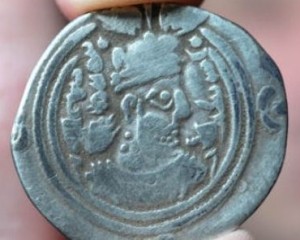 Archaeologists excavating a field near Anklam in Mecklenburg, Western Pomerania, uncovered a cache of 82 silver coins and coin fragments, a silver bracelet and 3 silver bars dating to the early Middle Ages. Finds from this era are rare, large numbers of coins from this era are even rarer, and large numbers of coins from this era that were minted in Arabic states practically unheard of.
Archaeologists excavating a field near Anklam in Mecklenburg, Western Pomerania, uncovered a cache of 82 silver coins and coin fragments, a silver bracelet and 3 silver bars dating to the early Middle Ages. Finds from this era are rare, large numbers of coins from this era are even rarer, and large numbers of coins from this era that were minted in Arabic states practically unheard of.
The oldest coin is from around the year 610. The most recent coin has been dated back to roughly 820 AD.
“The discovery of Arabic coins at the coast of the Baltic sea proves that there was global trade more than 1,200 years ago,” said Greifswald historian Fred Ruchhoeft.
The coins were minted in regions belonging to modern-day Iran, Iraq, Afghanistan or northern Africa. They are thought to have reached Northern Europe via trading routes along the Black Sea, the Dnieper river and the Volga, before reaching the Baltic sea.
The find is near a former Slavic settlement, and gives new information about the importance of the region, in Pomerania, during the early Middle Ages.
Anklan is on the Peene river, a bustling source of trade for the Slavic settlement. The Viking town of Menzlin — a hub of trade with both east and west — was right next door. The Vikings traded with the Arabs and the Slavs, so they could have been the means by which Arabic coins ended up in Pomerania. Alternatively, Arabic traders could have made their way directly or Slavic traders might have returned from a voyage bearing Arabic currency.
The coins wouldn’t have had the monetary value they carried in their lands of origin. Their value would have been purely the weight of the silver, which is why coin fragments were found. People cut them up to trade as silver pieces. The full weight of the silver in the cache was 200 grams. That would have been the price of 4 oxen or 1 human slave.
It’s like The 13th Warrior only not really, really stupid.
I think I’d take the four oxen.
Or maybe 2 oxen and a midget.
Stick with the four oxen. Unless it’s a particularly entertaining jester-type midget.
Great read!!!
Thank you!
It’s like The 13th Warrior only not really, really stupid.
😆
:hattip: